 |

|
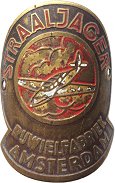 |
|
 |
| History |
Jan de Wilde, born in 1907 in Amsterdam,
grew up in the bicycle business. At the age of seven, he already helped his father in his
bicycle shop in Amsterdam. When he became sixteen, De Wilde started working at the Hartog
cycleworks in the Haarlemmerstraat in Amsterdam. Here he learnt how to build bicycle
frames, and in only a few years he became manager.
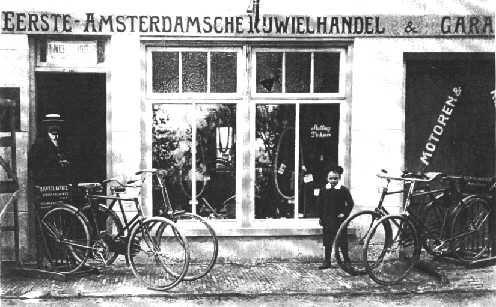
Jan de Wilde as a 7
years old boy in front of his father's shop
In the early thirties Hartog moved to
Zeist, and De Wilde followed. During the economic crisis in Germany, director
T. Hartog employed skilled workers from German bicycle factories. Around 1934 Hartog
advised De Wilde to start his own business.

Acting on this advice, De Wilde started selling
‘Hartog’ bicycles in his shop at the Oud Arnhemse Bovenweg in Zeist. The
business went very well, and soon at the Steinlaan in Driebergen he opened a second shop.
At the end of the thirties De Wilde sold his two shops and moved back to Amsterdam. Here,
in 1942 he took a participation in the enamel coating works ‘Linco & Co.’.
This company also produced bicycles.

In 1946 de Wilde bought out his partner van Lienen and so he
became the sole owner of ‘Rijwielfabrieken J. de Wilde’ located in the Govert
Flinkstraat 231 in Amsterdam. Here De Wilde employed thirty people. Due to lack of space
the company moved to the Gelderschekade 115, where at first only frames were built.
Starting in 1947 also complete bicycles were manufactured and sold under the brand name
'Straaljager'.
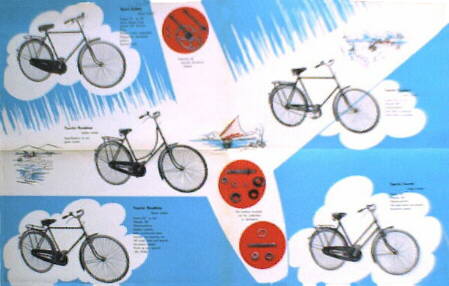
"Straaljager"
folder from the early 50's
At the beginning of the fifties the
company employed fifty people. Outgrowing his site at the Gelderschekade, De Wilde decided
to build his own factory in the fishing village Volendam. This site was ready in 1952. De
Wilde now produced ‘Straaljager’ bicycles, tandems and -for a short while-
motorised bicycles. Moreover all kinds of frames were manufactured for wholesale trade.

At this stage the production of bicycle-frames amounted to
approximately 25,000 per year. Within the Netherlands De Wilde had now risen to the group
of major bicycle manufacturers and frame-constructors. Using the brand name
‘Thunderjet Cycleworks - Volendam/Holland’ he exported his tandems (two up to
six seated!) to the USA. Indonesia was an important export-market, too.
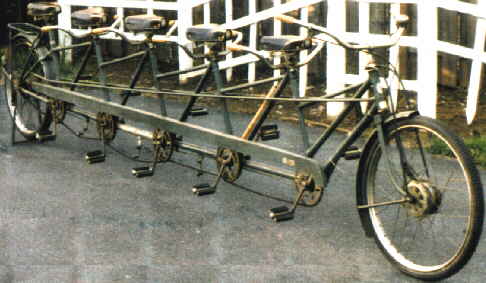
"Thunderjet"
quintuplet
Manufacturing of the
‘Straaljager’-bicycle continued up to 1958. Then De Wilde refocused his
attention to the sole production of frames. The company grew and now counted 80 employees.
Export centred more on Germany and France.

His two sons, Willem and Herman also worked at the company.
In the early sixties Herman De Wilde was production manager of the company, until he died
unexpectedly in 1963, 28 years of age.

In 1963 or 1964 Mr. Visser, a well known professional in the
bicycle branch, became production manager at De Wilde. Before he had worked in the
management of Juncker in Apeldoorn, and from the twenties up to the early fifties he had
been manager at the bicycle factory De Locomotief in Amsterdam. Mr. Visser modernised the
production of De Wilde extensively and until the end in 1977 he remained the owners right
hand.

In 1968 De Wilde bought the bicycle factory Veeno, which bankrupted and closed in 1967. Later in the seventies,
using this brand and the names Veenolite, Tors and Vedra, De Wilde again started producing
his own bicycles, with inclusion of tandems. For export, mainly to Germany, the brands
Straaljager and Rocket were used.

But at this time the main product remained bicycle frames.
Amongst the clients in the seventies were named brands like Servellen/DCR, Benzo and
Velenzo, but also wholesalers with brands like General All-Steel, Armeevo, Royal Granada,
Bell-Air, Holland Sport, IJsselmeer, Rezo and Olympic.

In 1970 J. De Wilde fell ill and his eldest and only
remaining son Willem took up the task of managing and leading the firm. He decided to move
the entire company to Nieuwe Niedorp. Here De Wilde had bought a bankrupted company in
1962, to be used as secondary factory. Before it’s decline this company had produced
bicycles under the name Havrelux with frames bought from De Wilde.

On march 6th 1973 the founder Jan De Wilde died. His son
remained as general manager of the company. Following the dollar-crisis part of the export
collapsed and he started to reorganise and reorient the company from specialised
framebuilding to complete bicycle-producing. In 1974 the company-name was changed to
‘Rijwielfabriek Veeno De Wilde BV’. |

De Wilde
sought for new models and ideas and came up with an ancient one: the classic ladies’
roadster model. In previous years this pre-war model had lost popularity, but De Wilde saw
prospect. At the ‘Tweewieler RAI’ (the annual Dutch bicycle trade fair) in 1976
he introduced the ‘Veeno Tors - model 1886’. Later this model would find a
rising market. (Indeed nowadays in the Netherlands this so-called ‘Omafiets’ is
one of the most popular types of bikes and very much in want with consumers and bicycle
thieves - note from the translator). Furthermore De Wilde sold common sports bikes of
brand Vedra, Veeno tandems and Veenolite road racers. |

In this
period the annual production amounted between 80,000 and 100,000 frames, including 25,000
to 30,000 complete bicycles. Of this total one third was exported. The company was modern,
well run and had plenty of work. Because of an incurable illness the dynamic Willem De
Wilde contracted, in the begining of 1977 the success turned. Further complication was the
not yet completed reorganisation.

Without De Wilde at the helm all coordination in the firm
was lost. The organisation of such a company with over 300 suppliers is a complicated and
sensitive matter. Soon the stock-availability became erratic, bicycles couldn’t be
completed, deliverance’s were delayed. The solvability of the company was in
question. Suppliers, alarmed by rumours about the owner’s illness, closed down all
credit. It was a vicious circle. The tragedy of the situation was best expressed by the
words of the owner. From his sick bed Willem said: ’If it’s up to me, I would go
directly to the factory. A few calls and the telex, I would have it all running in no
time. But I’m not able to!’

In September 1977, just before on November 4th the not even
45 year old Willem De Wilde died, Rijwielfabriek Veeno De Wilde BV went bankrupt. Searches
for a successor/buyer in the Netherlands or Germany were unsuccessful.

Finally, the company was sold to the bicycle wholesaler
Smits in Capelle aan den IJssel. He auctioned ‘Rijwielfabriek Veeno De Wilde BV’
in may 1978.

The last page of the De Wilde story was the
demolition of the old factory in march 2006. |
| Source |
The information about Rijwielfabriek De
Wilde is derived from Jan de Wilde. He is the grandson of the founder and
is searching for Thunderjet, Straaljager, Rocket, Havrelux and Veenolite
bicycles. Additionaly, he collects transfers of these brands, old invoices, articles of
advertising matter as well as all information about 'Rijwielfabriek Veeno De Wilde B.V.'
(Thunderjet Cycleworks). |
Have you got an old Thunderjet bicycle?
Then add the bicycle to the bicycle database and get feedback
about your bike. For more information click here.
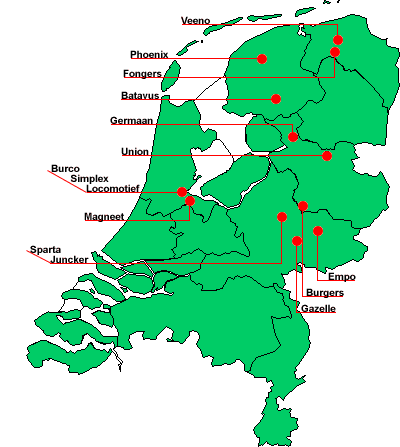
Copyright by Jan
de Wilde and Herbert Kuner, © 1999 ...
All rights reserved.

Last update: 03/30/2006
|